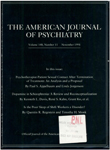HPA axis hyperactivity and recovery from functional psychoses
Abstract
Some patients with functional psychoses follow a chronic, deteriorating course and others recover; at present clinicians have essentially no established factors beyond diagnosis and chronicity to predict which course a psychotic patient might follow. Because data on diagnostic specificity suggested that the dexamethasone suppression test might provide another, much needed prognostic factor, the authors administered these tests to 98 consecutively admitted patients with nonmanic psychoses. High postdexamethasone cortisol levels (6 micrograms/dl or higher) at baseline predicted recovery from psychosis at 1 year, independent of episode chronicity and diagnosis. Diagnosis did not correspond well to test results but was itself an important predictor.
Access content
To read the fulltext, please use one of the options below to sign in or purchase access.- Personal login
- Institutional Login
- Sign in via OpenAthens
- Register for access
-
Please login/register if you wish to pair your device and check access availability.
Not a subscriber?
PsychiatryOnline subscription options offer access to the DSM-5 library, books, journals, CME, and patient resources. This all-in-one virtual library provides psychiatrists and mental health professionals with key resources for diagnosis, treatment, research, and professional development.
Need more help? PsychiatryOnline Customer Service may be reached by emailing [email protected] or by calling 800-368-5777 (in the U.S.) or 703-907-7322 (outside the U.S.).



